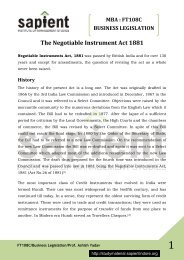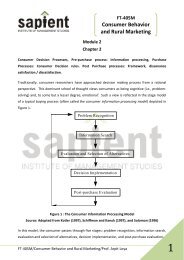BUSINESS LAW THE INDIAN CONTRACT ACT, 1872
BUSINESS LAW THE INDIAN CONTRACT ACT, 1872
BUSINESS LAW THE INDIAN CONTRACT ACT, 1872
You also want an ePaper? Increase the reach of your titles
YUMPU automatically turns print PDFs into web optimized ePapers that Google loves.
PGDM : 2003<br />
<strong>BUSINESS</strong> <strong>LAW</strong><br />
Termination of bailment<br />
Where the bailee wrongfully uses or dispose of the goods bailed, the bailor may determine the<br />
bailment (Section 153.)<br />
As soon as the period of bailment expires or the object of the bailment has been achieved, the<br />
bailment comes to an end, and the bailee must return the goods to the bailor (Section 160).<br />
Bailment is terminated when the subject matter of bailment is destroyed or by reason of change<br />
in its nature, becomes incapable of use for the purpose of bailment.<br />
A gratuitous bailment can be terminated by the bailor at any time, even before the agreed time,<br />
subject to the limitation that where termination before the agreed period causes loss in excess of<br />
benefit, the bailor must compensate the bailee (Section 159).<br />
A gratuitous bailment terminates by the death of either the bailor or the bailee (Section 162).<br />
Finder of Lost Goods<br />
The position of a finder of lost goods is exactly that of a bailee. The rights of a finder are that he<br />
can sue the owner for any reward that might have been offered, and may retain the goods until<br />
he receives the reward. But where the owner has offered no reward, the finder has only a<br />
particular lien and can detain the goods until he receives compensation for the troubles and<br />
expenses incurred in preserving the property for finding out the true owner. But he cannot file a<br />
suit for the recovery of the compensation [Section 168].<br />
<strong>LAW</strong> OF AGENCY<br />
Definition of Agent (Section 182)<br />
An agent is a person who is employed to bring his principal into contractual relations with thirdparties.<br />
As the definition indicates, an agent is a mere connecting link between the principal and a<br />
third-party. But during the period that an agent is acting for his principal, he is clothed with the<br />
capacity of his principal.<br />
Creation of Agency<br />
A contract of agency may be express or implied, (Section 186) but consideration is not an essential<br />
element in this contract (Section 185). Agency may also arise by estoppel, necessity or ratification.<br />
1. Express Agency<br />
2. Implied Agency<br />
3. Agency by Estoppel (Section 237)<br />
4. Wife as agent<br />
2003/Business Law/Prof. Neetika Shrivastav<br />
6








